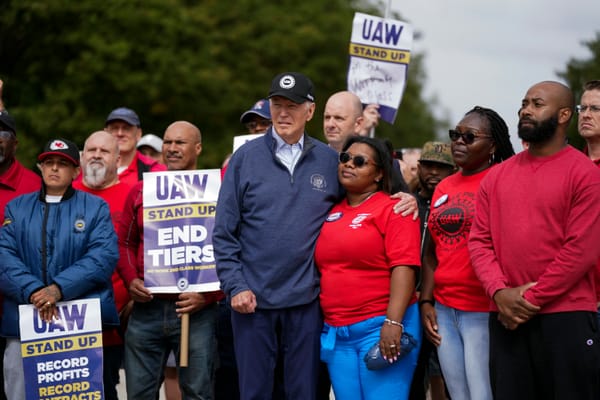In July, some observers were baffled that Bernie Sanders and The Squad—the democratic-socialist contingent in Congress—were among the last Democrats to abandon ship as President Biden’s re-election bid unraveled following his disastrous debate performance. Why expend political capital as a dead-ender for an unpopular centrist?
The explanation is simple: For all of Biden’s flaws, his domestic agenda was the most economically populist since the neoliberal turn in the 1970s. Defending Biden at that moment reflected some doubt that Kamala Harris would be as reliable a champion of the working class and organized labor.
Four years ago, I scoffed when Biden promised to become the most pro-union, pro-worker president in history. But while he doesn’t quite get to claim that title—take a bow, FDR—Biden’s accomplishments are impressive, all the same. His National Labor Relations Board was the most pro-labor in at least half a century, and the number of workers filing for union representation doubled. Biden’s NLRB also made it much easier to enforce contracts and inflict penalties against employer violations. Last fiscal year, the board’s field offices received 24,578 unfair-labor-practice filings—the most in more than a decade. Biden’s massive investments in industrial policy and infrastructure, meanwhile, boosted demand for union labor.
To recap, Biden’s administration successfully lowered the barriers to unionization, strengthened state capacity to enforce workers’ rights, and increased the number of unionized jobs through bills like the Bipartisan Infrastructure Law. There’s a good chance Biden’s record would look even better had not Sens. Joe Manchin and Kyrsten Sinema pressured Democrats to scale back their ambitions. Anyone remember Biden’s chatter about the possibility of full employment?
Biden’s pro-labor policies were supposed to boost Democrats because union workers would reward them at the ballot box. Instead, the working class’s rightward drift into MAGA land continues, especially among union men engaged in tangible toil. Many top Democrats likely see Biden’s labor record as a failure because the administration failed to yield the desired political dividends, meaning Harris might be wary of maintaining the same stance.
“The jury is out on what a Harris White House would mean for labor.”
The jury is out on what a Harris White House would mean for labor. The good news is that she is promising to pass the PRO Act, which strengthens unions and weakens right-to-work laws, and the Public Service Freedom to Negotiate Act, which would guarantee public-sector workers the freedom to unionize.
But there are also signs that she is taking an Obama-esque approach to the issue: a vague pledge to labor that mirrors the Democrats’ commitment to other special interest groups, as opposed to one that recognizes the centrality of workers. At times, she has celebrated labor publicly, as when she told rally-goers in Michigan on Labor Day that they “better thank a union member”—but talk is cheap.
A reason for skepticism is that Harris’s top adviser (“guiding hand,” as Vanity Fair called him) is her brother-in-law, Tony West, a former official in Obama’s Justice Department. To work on the campaign, West took a leave of absence as the chief legal officer of Uber, which had recently sued the California Department of Labor over a 2020 law obliging ride-app platforms to treat drivers as employees, rather than independent contractors, thus entitling them to benefits like overtime pay, paid sick leave, and unemployment insurance.
There’s also the looming Lina Khan problem. Democratic mega-donors like Reid Hoffman and Mark Cuban want the antitrust crusader out, and when the Teamsters reached out to ask Harris whether she would retain Khan as chairwoman of the Federal Trade Commission, the campaign declined to answer. What Harris decides if elected will be a big tell on which direction her administration’s winds are blowing.
There is a more fundamental problem: The Democrats appear to be taking the wrong lessons from Biden’s poor approval ratings. Rather than chalking up much of it to Biden’s brain turning into a bowl of soft-serve ice cream and his inability to sell the public on his big policy achievements, they are interpreting anti-Biden sentiment as a referendum on Bidenomics, and assuming the public’s sour mood means they should eschew ambitious economic reforms—hence, Harris’s focus on minor tinkering with tax credits, small-business loans, and the like. At least on the campaign trail, Build Back Better has been retired in favor of “Capitalism for the Middle Class,” whatever that means.
Trump will be much worse on the labor question, if his record of appointing union-busters to the NLRB and recent antics like joking with Elon Musk about firing workers en masse are anything to go by. Lately, it seems his running mate, the more union-sympathetic JD Vance, has been edged out by Musk, a sworn enemy of the labor movement and the regulatory and legal apparatus that protects it; one of his companies, SpaceX, has launched a lawsuit charging that the NLRB is unconstitutional. If the richest man in the world gets to influence economic policy to the degree he would like, the results for American workers will be predictably disastrous. Sadly, in part because the Democrats are professional wolf-criers, many union voters don’t believe them when they point to the dangers posed by a second Trump term.
Though he is still the sitting president, Joe Biden already feels like a forgotten man. But considering his strong record on labor—and the alternatives in this election—he shouldn’t be.
